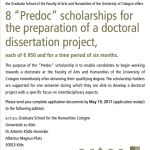“Activism and antiracism in education: telling our stories” — The Centre for Education for Racial Equality at The University of Edinburgh (CERES 2017)
‘Activism and antiracism in education: telling our stories’
Biennial Conference, 14-16 June 2017 Moray House School of Education, Edinburgh
CERES 2017
Click here to download CFP as a PDF
Keynote speakers
Professor Eduardo Bonilla-Silva, Duke University, Racism in a Post-Racial America
Professor Gloria Wekker, University of Utrecht, White Innocence in the Dutch Academy
Professor Robert Phillipson, University of Copenhagen, Global English, an imperialist project?
Professor Tove Skutnabb-Kangas, Anti-Linguicist and Pro-Linguistic-Human.Rights Education – what, why and how?
Conference Themes
(1) Reclaiming teacher activism/political literacy
It is hard for teachers to be part of a system that recreates the inequalities of society and, at the same time, to try and change that system. One indication of the challenge is the recognition by advocates of a social justice approach to teacher education that being “critical” is not enough and that teachers have a responsibility to act as agents of social change. For this to become reality, teachers need to be able to consider how change can come about in their context, what obstacles need to be overcome and how specific issues of discrimination relate to wider influences in society.
This strand welcomes proposals from teachers and teacher educators who have stories to tell of anti-racist activism. We hope to draw lessons about how a political understanding of society helps teacher activists to be agents of change.
(2) The power of intergenerational activism and solidarity
Racism and discrimination shape the experiences of different generational groups in specific ways. Inequalities develop in complex ways across the lifecourse, and while generational interests sometimes appear in tension, global events have shown that there is a need for intergenerational solidarity and activism in order to address persisting inequalities of race and other categories.
Intergenerational relationships are a key site of both reproducing and challenging race and other inequalities, whether in professional relationships – e.g. working with children and young people – or in personal relationships within families and communities.
This stream welcomes contributions that explore the experiences of racism and other forms of discrimination of different generational groups, give voice to generational groups that are silenced, and link these to intergenerational activism and social change.
(3) Countering monolingual hegemony in education
Globalisation and migratory forces have resulted in ever increasing linguistic diversity in contemporary educational contexts. Yet dominant language policies frequently ignore the realities of multilingual classrooms and conceptualise/position speakers of indigenous, heritage and regional languages as a problem rather than as a resource. This stream welcomes papers examining ways in which educators and community activists disrupt prevailing monolingual ideologies by creating spaces where learning takes place in two or more languages both inside and outside of schools, colleges, universities, and community and adult education. It also encourages contributions concerning ways in which children and young people take a critical stance towards the role of languages in any educational context and actively participate in translanguaging/ multilingual practices for educational purposes.
(4) Decolonising the curriculum
The masters’ tools will never dismantle the master’s house – Audre Lorde
Countering dominant hegemony and narratives require different strategies. Inserting new inputs into the curriculum (tinkering) can leave existing curriculum largely unchanged. Decolonisation is about dismantling, requiring critical reflective thinking and a robust understanding of how European and Western knowledge, language and power structures have shaped curriculum. Decolonising the curriculum also calls for a re-theorising of the history, contributions and experiences of black, minority and indigenous peoples, thereby de- sanitising what is remembered. This strand welcomes papers by educators (school, college and university, community and adult education) who have looked at reframing curriculum and problemmatised the nature of knowledge.
Abstracts:
Abstracts for papers relating to one or more of these themes are welcomed. Abstracts of 250-300 words should be submitted to ceresconference2017@ed.ac.uk by Friday 28th April 2017. Abstracts will be peer reviewed by the CERES co-director team, and applicants will be notified of abstract acceptance by Friday 12th May 2017.
For further information please contact: The Centre for Education for Racial Equality in Scotland, The University of Edinburgh, Moray House School of Education Room B.04 Old Moray House Holyrood Road Edinburgh, UK. EH8 8AQ.
Tel: +44(0)131 651 6371; Email: ceresconference2017@ed.ac.uk


